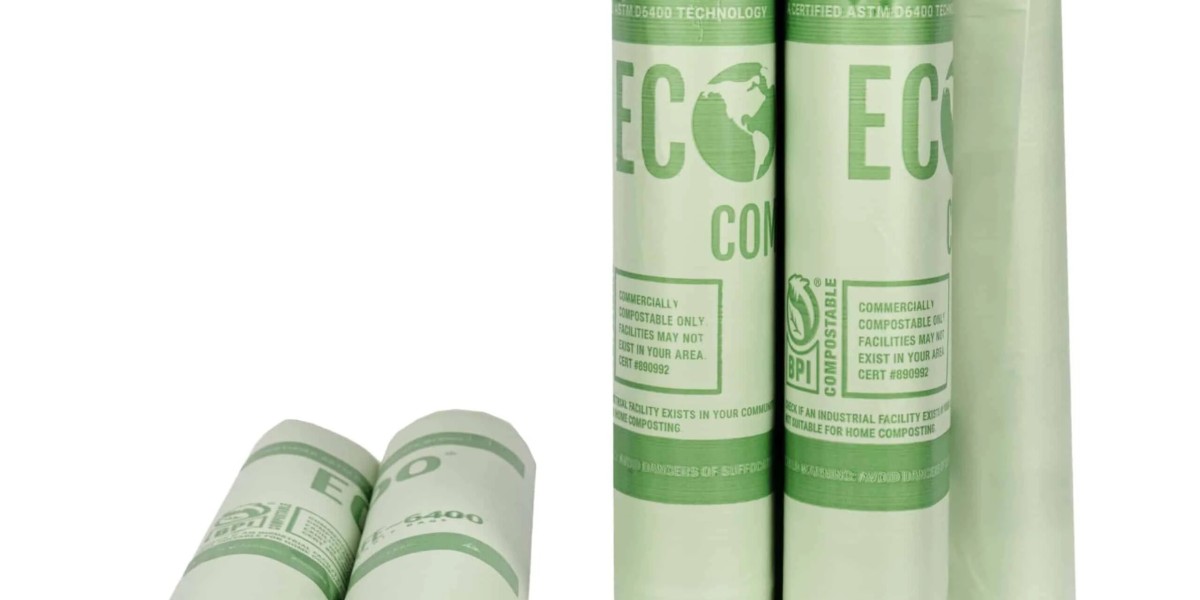Trash disposal is a growing concern in today's world, with landfills overflowing and waste damaging the environment. Thankfully, there are sustainable solutions available to help mitigate this problem, such as compostable trash bags. These innovative alternatives offer a more environmentally-friendly approach to responsible waste management. In this blog post, we will delve into what compostable trash bags are and how they work. We will also explore the advantages and disadvantages of using them, along with practical tips on their usage. So let's dive in and discover how these compostable wonders can revolutionize our approach to rubbish!
What are compostable trash bags?
Compostable trash bags are an eco-friendly alternative to traditional plastic garbage bags. Unlike regular plastic bags, which can take hundreds of years to decompose in landfills, compostable trash bags are designed to break down naturally and quickly.
These innovative bags are made from plant-based materials such as cornstarch, vegetable oils, or potato starch. They are specifically formulated to degrade within a composting environment without leaving behind any harmful residue.
Compostable trash bags come in various sizes and thicknesses, catering to different waste management needs. They possess the same durability and strength as their conventional counterparts but with the added benefit of being biodegradable.
The decomposition process for these bags relies on microorganisms present in compost piles or industrial-scale composting facilities. These microorganisms break down the bag's organic components into simpler forms that blend seamlessly into the soil.
By using compostable trash bags, you not only reduce your carbon footprint but also contribute to creating nutrient-rich compost that can be used for gardening or agriculture purposes. It's a win-win situation for both you and Mother Nature!
So next time you're shopping for garbage bags, consider making the switch to compostable options. Your waste disposal habits will become more sustainable while reducing environmental harm caused by traditional plastics. Let's embrace this eco-conscious choice together!
How do compostable trash bags work?
Compostable trash bags are a sustainable alternative to traditional plastic bags for waste management. But how exactly do they work? Let's take a closer look.
Compostable trash bags are made from plant-based materials such as cornstarch, sugarcane, or potato starch. These natural materials break down over time in the presence of oxygen and microorganisms, turning into compost-like material.
When you dispose of organic waste in a compostable bag, it undergoes the same decomposition process as other organic matter in a composting environment. The bag provides a convenient and eco-friendly way to collect your kitchen scraps, food waste, yard trimmings, and other biodegradable materials without contributing to landfill pollution.
One important thing to note is that compostable bags require specific conditions to decompose properly. They need exposure to air and heat generated during the composting process. So if you don't have access to an industrial composter or municipal composting facility that accepts them, it's best not to use them.
Using compostable trash bags helps divert organic waste from landfills while also reducing our dependence on fossil fuel-based plastics. However, it's crucial to remember that they should only be used for biodegradable waste and not mixed with non-compostable items like plastic bottles or metal cans.
By opting for compostable trash bags, you can contribute positively towards responsible waste management practices while minimizing your carbon footprint.
Advantages of using compostable trash bags
Advantages of Using Compostable Trash Bags
Compostable trash bags offer numerous benefits for those looking to make their waste management practices more sustainable. Here are some advantages of using compostable trash bags:
1. Environmentally Friendly: Compostable trash bags are made from materials that can break down naturally, without leaving behind harmful residues or contributing to landfill waste.
2. Reduced Plastic Waste: Traditional plastic bags take hundreds of years to decompose, while compostable ones break down in a matter of months, significantly reducing the amount of plastic waste in landfills.
3. Nutrient-Rich Soil: When compostable bags decompose along with organic waste, they contribute to the creation of nutrient-rich soil known as compost. This can be used to nourish plants and gardens, closing the loop on the waste cycle.
4. Versatility: Compostable trash bags come in various sizes and strengths, making them suitable for different household needs and even commercial settings.
5. Odor Control: Many compostable trash bags are designed with odor control properties, helping keep unpleasant smells contained within the bag until it is time for disposal.
6. Support for Circular Economy: By choosing compostable options, you're supporting a more circular economy where resources are utilized efficiently and sustainably.
Remember that making small changes like switching to compostable trash bags can have a big impact on our environment over time! So why not give them a try today?
Disadvantages of using compostable trash bags
Disadvantages of using compostable trash bags
While compostable trash bags may seem like a great eco-friendly option for waste management, it's important to consider their potential drawbacks. One major disadvantage is the cost. Compostable trash bags tend to be more expensive than traditional plastic bags. This can add up over time, especially if you have a large household or generate a significant amount of waste.
Another downside is that not all compostable trash bags are created equal. Some brands claim to be compostable but may only break down in industrial facilities, rather than in home composting systems. It's crucial to research and choose reputable brands that meet recognized standards for composability.
Compostable trash bags also have limitations when it comes to durability and strength. They may not hold up as well as traditional plastic bags, particularly with heavy or sharp objects. This can result in leaks and spills, creating an unpleasant mess.
Additionally, some people find that compostable trash bags have a shorter shelf life compared to regular plastic ones. If they are exposed to moisture or heat for extended periods of time, they can start degrading prematurely.
There is still limited availability of composting facilities in many areas. Without access to proper infrastructure for organic waste disposal and processing, using compostable trash bags becomes less practical and effective.
It's important to weigh these disadvantages against the environmental benefits before deciding whether or not to use compostable trash bags as part of your waste management routine
How to use compostable trash bags
Using compostable trash bags is a simple and effective way to contribute to responsible waste management. Here's how you can make the most of these sustainable solutions:
1. Choose the right size: Before using a compostable trash bag, consider the volume of your waste and select an appropriately sized bag. This will ensure that it fits snugly in your bin without any excess material.
2. Line your trash bin: Place the compostable bag inside your trash bin, ensuring that it covers all sides and reaches up to the rim. This will prevent any leakage or mess.
3. Dispose of organic waste: Compostable bags are specifically designed for organic waste such as fruit peels, vegetable scraps, coffee grounds, and more. Collect this type of waste in a separate container or directly in the compostable bag.
4. Seal securely: Once your compostable bag is full, tie it securely at the top to prevent any odors or spills during transportation.
5. Proper disposal: When disposing of a compostable bag filled with organic waste, check if your local municipality has designated collection bins for organics. If not, explore options for home composting where you can turn this valuable resource into nutrient-rich soil.
By following these simple steps, you can effectively use compostable trash bags as part of your eco-friendly waste management routine!
Where to buy compostable trash bags
Where to buy compostable trash bags
When it comes to finding the best place to purchase compostable trash bags, there are several options available. The first and most convenient option is online retailers. Many eco-friendly websites specialize in sustainable products, including compostable trash bags. These sites offer a wide range of brands and sizes to choose from, making it easy to find the perfect fit for your needs.
Another great option is local health food stores or zero-waste shops. These establishments often prioritize environmentally friendly products and may carry a selection of compostable trash bags. By supporting these small businesses, you not only reduce your ecological footprint but also contribute to the local economy.
If you prefer the convenience of shopping at a larger retail store, some supermarkets and big-box retailers now stock compostable alternatives alongside traditional plastic bags. Look for them in the household goods section or ask an employee for assistance.
Farmers markets and community events focused on sustainability sometimes have vendors selling eco-friendly products such as compostable trash bags. This can be an excellent opportunity to speak directly with producers and learn more about their brand's mission.
With so many options available today, finding where to buy compostable trash bags has never been easier! Start incorporating these sustainable solutions into your waste management routine and make a positive impact on our planet's future
Conclusion
Conclusion
Compostable trash bags are a sustainable solution for responsible waste management. These innovative bags are designed to break down naturally in composting systems, reducing the environmental impact of traditional plastic garbage bags.
By using compostable trash bags, you can actively contribute to reducing landfill waste and greenhouse gas emissions. The process is simple - just fill the bag with your organic waste and place it in a compost bin or pile. Over time, the bag will decompose along with its contents, turning into nutrient-rich soil that can be used for gardening or other purposes.
The advantages of using compostable trash bags are numerous. Not only do they help divert organic waste from landfills, but they also eliminate the need for single-use plastic bags which take centuries to degrade. Compostable trash bags are made from renewable resources such as plant-based materials and biopolymers, making them a more sustainable option.
However, it's essential to consider some disadvantages when using these bags. While they offer an eco-friendly alternative, they may not be as durable as traditional plastic garbage bags and could tear more easily if overloaded or subjected to sharp objects. Additionally, not all communities have access to municipal composting facilities that accept these types of products.








